Latest posts by Michael Gerber (see all)
- From Faith Current: “The Sacred Ordinary: St. Peter’s Church Hall” - May 1, 2023
- A brief (?) hiatus - April 22, 2023
- Something Happened - March 6, 2023
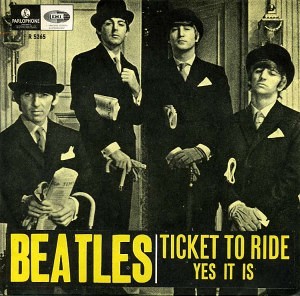
Beatles as City Gents. Bowlers—check. Umbrellas—check. Fat arses—not shown.
MIKE GERBER • John, as we all know, claimed that “Ticket to Ride” was the first heavy metal song. (Actually he said “one of the first,” but we all know what John meant. He meant, “I personally invented heavy metal. As did Yoko.”)
But this weekend, KLOS’s Chris Carter commemorated the anniversary of Mal Evans’ death by playing Badfinger’s “No Matter What”—a tune Mal produced. As it played, I thought that “Ticket to Ride” seems more like the first “power pop” song than the first heavy metal one. Opinions?*
*”Yoko also played bass for Badfinger. Under the name ‘Carla Castenada.'”

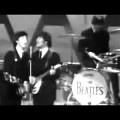
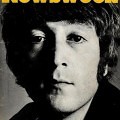
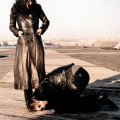
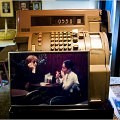
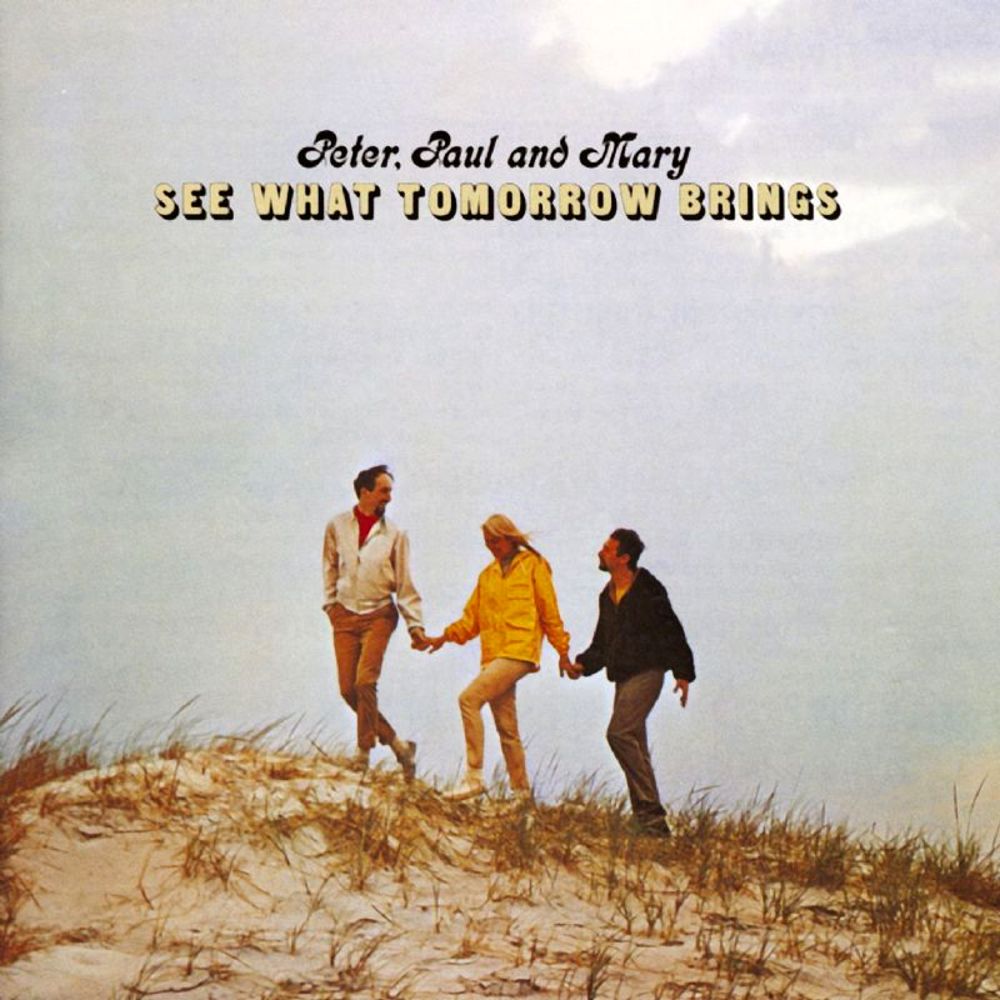
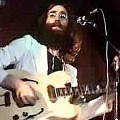
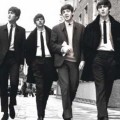
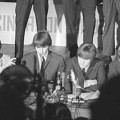
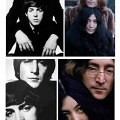
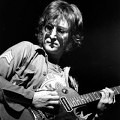
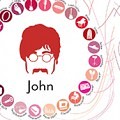
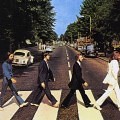
“Ticket to Ride” is absolutely power pop, in fact it’s still a definitive example. But it was far from the first power popper, and so has no real “pioneering” placement. But who cares, I find it every bit as dynamite today as I did on first hearing it, when it was less than a decade old; I can only imagine that makes it as dynamite today, or very nearly so, as it was the day it was released. It’s absolutely perfect. Smashing. Astonishing.
The narrative has usually been that heavy metal started sometime in 1968, the year when Blue Cheer released Vincebus Eruptum; Iron Butterfly blessed us with “In-a-Gadda-Da-Vida”; Steppenwolf released their first two albums; and Jimmy Page, who’d briefly marshaled the remnants of the old Yardbirds as the New Yardbirds, formed Led Zeppelin. That still sounds plausible to me, though anyone can come up with “heavy” records predating those; the point is 1968 seems like an agglomeration point, the year a real genre was born.
You could also make an argument that some of that first heavy metal is basically just “Ticket to Ride” slowed way, way down, and sluiced through with blues; but I don’t know why you’d want to.
So whaddaya think, Devin? “You Really Got Me”? That’s the one that comes to my mind.
Does Link Wray and his 1958 “Rumble” with distorted guitar (Jimmy Page has pointed to him as an influence) qualify? Distortion (I think he poked a hole into his amp) feedback, power chords and a heavy metal attitude. But before Link Wray, other black r&b (according to Bo Diddley that’s what they called rock and roll when it was played by black artists) guitarists were shredding. There are no firsts in rock. It’s a river of sound.
“You Really Got Me” is the one I instantly thought of, Mike. But “All Day and All of the Night” was also from ’64. There was also the Honeycombs’ “Have I the Right,” a Joe Meek production and #1 hit that same year; I’d count it because while drum-heavy, it has a strong guitar presence, it’s melodic, and it’s distinctly high-energy, all of which I figure are essential to a power pop designation.
And Hologram Sam is right, of course. “The first” is just a game we sometimes play, and we shouldn’t flatter ourselves that we’ve ever really found the beginning of anything. “The first recorded instance” or “The first hit version” of something may be a different matter …
Oh I remember “Have I the Right”! It was part of my Beatle Aunt’s precious 45s collection, what I cut my musical teeth on back in the late 70s.
http://youtu.be/r9C3tZwDpx4
Dig that female drummer! (“Yoko. Obviously Yoko.”)
Here’s Link Wray’s “Rumble,” which if it’s not in a Quentin Tarentino movie, somebody should get fired:
http://youtu.be/ucTg6rZJCu4
Since we’re playing, I’d disqualify “Rumble” for being an instrumental. But the point of my post wasn’t to get involved in Rock Scholasticism, but because Lennon’s right in some way–“Ticket to Ride” is the first Beatles song of a certain type–just not in the way he claimed. Thoughts?
“Ticket To Ride” is the first Beatles song with heavy drums. That’s the only way I can describe it. The “heavy drum” tradition continued with “Paperback Writer” and “Helter Skelter” but I think “Ticket” was the first. The drum arrangement goes beyond the snappy Liverpool backbeat and into heavier territory.
(Elvis Costello used the same beat in “This Year’s Girl” quite effectively.) It’s fun to watch a live performance (there’s a few on youtube) just to see Ringo do his thing.
Sam, how do you define “heavy drums”? Would the tub-thumping intro to “What You’re Doing” count as heavy?
“Sam, how do you define “heavy drums”? Would the tub-thumping intro to “What You’re Doing” count as heavy?”
Hi, Ingrid. I’m not sure if I’d include “What You’re Doing” although I love that particular track, the drums and Paul’s bass solo.
What I meant by “heavy” is something beyond the famous backbeat. I’m not a drummer, so I can’t put it in technical terms. The drum arrangement for “Ticket To Ride” (as well as Elvis Costello’s “This Years Girl”) features a slowed-down on-beat, and it reminds me of the unconventional rhythm of “Tomorrow Never Knows.”
The first power pop song? Hmmmm…how about The Kingsmen’s “Louie, Louie”? That was the father of “You Really Got Me”, “All Day and All of the Night”, and “I Can’t Explain”.
Okay, a prehistoric version of Power Pop: this is a 1957 version of Bo Diddley’s “Mona” interpreted by Buddy Holly. Buddy didn’t live to finish the track, they laid down drums, guitar and a scratch vocal. But the elements of Power Pop are all there:
http://www.youtube.com/watch?v=jFs32gZHEsE
No Matter What, as with every other Badfinger song, always takes on an extra dimension when I listen to them as a result of the tragic events that went beyond the music.
I loved the way Jellyfish shamelessly copied them (and Macca & The Beatles too) and kickstarted Power Pop for the 90s.
Cotton Mather then copied all of the above and completed the circle taking everything right back to Rubber Soul and Revolver.
Agreed, @John. I try not to let Badfinger’s cruel fate overwhelm my appreciation of their songs, but I’m not always successful.
I don’t know who came up with the drum arrangement for “Ticket To Ride” – Ringo or John, but it makes the song a Beatles’ “first”. You can draw a line from “Ticket To Ride” to “Tomorrow Never Knows” and beyond.
As far as hearing extra dimensions because of the Badfinger tragedy, I get the same feeling from “Have I The Right.” I can’t listen to those percussive Joe Meek productions without hearing Joe stomping on the floor/ceiling of his poor landlady.
@hologramsam
It was actually Paul who came up with the drum part for Ticket to Ride. John said that in a few interviews. Of course cmiiw.
It was actually Paul who came up with the drum part for Ticket to Ride. John said that in a few interviews.
Thanks, Linda A. I didn’t know that.
For years I bought into the myth that any song with John on lead vocal was pure Lennon. Thanks to HeyDullBlog I’ve learned about Paul’s contributions to my favorite “John” songs (like the “Strawberry Fields” intro) and the more I learn, the more I respect and appreciate Sir P.
And–as I think has been mentioned in the thread, @Sam–Paul was playing lead on “Ticket to Ride.” Between the drum and the riff, that’s a hell of a lot of what we’re talking about here!
I *think* (although I’m not positive) that George played the riff and Paul plays the breaks after the bridge and during the tag.
I love “Louie Louie” but I can’t see it as power pop, even though you can hear it in “You Really Got Me,” and even though the Kinks did their own, really, really bad, version of it. (They were also covering a lot of the same classic rock ‘n’ roll as the Beatles, like “Too Much Monkey Business” and “Long Tall Sally,” and it’s all freaking terrible; the Kinks were only ever good at original material.) If I’m really listening, I see the influence of “Louie” on the British groups as being entirely limited to the fast, savage guitar break. But otherwise the Kingsmen’s record (based of course on the Richard Berry & The Pharaohs original, which was calypso-flavored R&B from Los Angeles) is pure atavistic garage or proto-punk rock–which often overlaps with power pop, but not here. IMHO.
But speaking of the overlap, Stiv Bators in 1979 did a cover version of a song called “It’s Cold Outside,” from the short-lived Cleveland group The Choir–whose lead singer, Eric Carmen, of course went on to form Raspberries, probably the greatest power pop group of all time. The Choir’s “It’s Cold Outside,” from 1966, is essential power pop.
Thinking about it for longer than three seconds, I see that “Louie” has influence on those Invasion records beyond the guitar break–the way the Kingsmen rearranged the song for rock as a series of chunky chord clusters: DUM, da-DUM, da-DUM, da-DUM-DUM is similar to the da-DUM-DUM-DUM-DUM of “You Really Got Me,” or the DUM, da-DUM, da-DA-DA-DA-DUM of “All Day,” or however the da’s and DUM’s of “Can’t Explain” go (can’t bring them precisely to mind at the moment, and it’s too early for YouTube).
So I agree with you, J.R., that “Louie” (the Kingsmen’s mutation of it) is definitely a father of power pop, though I still don’t hear it as an example of it.
Agree @Devin, that “Louie Louie” is in the bloodline, but not exactly power pop. It’s not melodic enough. I assumed we’d get to Nuggets when I posed the question, but to me at least there has to be a significant melody for something to be pop as well as power.
Just for comparison’s sake, here’s the Raspberries “Go All the Way”:
http://youtu.be/ybB6BWvb6bk
Dig that impossibly crunchy guitar…that dissolves into an arrangement so sugary it’s pre-Beatles, more like Beach Boys. Then the “middle eight”–the shouty bit, followed by rave-up call-and-response, then back to the melody. It’s really amazingly synthetic.
I’ve always had a pet theory, expressed to nobody but my wife, that truly great pop songs have to have three distinct pieces, each arresting on their own, but fitting together. If they only have two, they feel unfinished—and this is why both Lennon’s and McCartney’s solo stuff is so frequently unsatisfying; they didn’t have the other guy to suggest the third bit, the “release” that sets off the other stuff.
I can’t “da-dum” the guitar in “I Can’t Explain” because I hear it as a series of “DANT”s, even though I’m aware that “DANT” has not (yet) achieved the same status as Technical Musical Term as “da” or “dum”.
Anyroad, to me, “I Can’t Explain” goes:
DANT!
DA-nant!
DANT!
DA-nant!
Like “Louie, Louie”, just slightly stabbier.
Speaking of groups who were better at doing original stuff than covers, I think the Who rival the Kinks for best exemplar. Pete Townshend loved the Rolling Stones and kinda wanted to be them and took Keef and Mick’s jailing in 1967 as an excuse to vow not to release anything other than Stones’ covers until the Rolling Stone Two were released. Fortunately, the Mick ‘n’ Keef were released relatively quickly, but not before we were subjected to the Who’s single covering “Last Time” and “Under My Thumb”, both of which I think technically qualify as crimes against humanity. Far, far worse than any crime Mick may have committed against a Mars bar (and I’m not saying he did).
The Who were much better at being the Who than they were at being the Rolling Stones; and I’d even go so far as to say they were better at being the Who then the Stones were at being the Stones. And I love me some Stones, so that’s not a shot at them.
@Tom, you’re right, those Who covers of the Stones were awful; so was their “Please, Please, Please,” from James Brown. But their “Heat Wave” (Martha & The Vandellas) and “Bucket T” (Jan & Dean) aren’t bad. Which to my ears anyway places them at least two up from the Kinks, who unless I’m forgetting never did a single cover, at least in the early years, that wasn’t embarrassing.
@Sam, you remind me of a bit from Saturday Night Live, with Laraine Newman as a leather-punk rock critic humorously blasting Elvis Costello (who’d just come out with This Years Model). She said he’d stolen his first name from Elvis Presley, his last name from Lou Costello, his look from Buddy Holly, and now–in reference to the same song point you mentioned–he was stealing the Beatles’ riffs. The clip doesn’t seem to be on YouTube, but here’s a transcript of the relevant “Weekend Update” segment: http://snltranscripts.jt.org/78/78qupdate.phtml
And speaking of just that, a far more obvious steal of the exact same “Ticket to Ride” riff occurs in the Beach Boys’ “Girl Don’t Tell Me,” released on the Summer Days (And Summer Nights!!) album on June 28, 1965, about four months after “Ticket.” Great little song, with just enough plagiarism to sweeten the listen!
@Devin: I was thisclose to mentioning “Heat Wave” as another example of Who cover song incompetence because I don’t much care for their version at all. But you do. Huh. Different strokes and all that. Oddly enough, I also thought of mentioning “Bucket T”, but I realized the problem I had was not with the Who’s version, but with the song itself, which I don’t care for. Even that French horn can’t salvage it for me, proving once and for all that there are things even a French horn can’t salvage – who knew? (Cf. “Heat Wave”, a song I do like, so I know it’s the Who version I have the problem with. Full disclosure: My fav version is Linda Ronstadt’s. Take that for what’s it’s worth … and I’m not sure what exactly it is worth.)
But the Who’s versions of “Eyesight to the Blind” and “Summertime Blues” (both studio and live of the latter) prove they could do decent covers, so I grudgingly concede your point that the Kinks are the winners of the Worst Cover Band sweepstakes. Of course, if your main song-writer is capable of composing songs like “Waterloo Sunset”, e.g., why in the world would you want to do covers? Fortunately, the Kinks figured that out relatively quickly.
To get back to Mike’s root question–what was “Ticket to Ride” the first of–it was definitely a breakthrough in the Beatles’ sound. It built on “I Feel Fine,” another John song based around a stellar (and quite difficult) guitar riff. The heavy drums, as Sam points out, are a whole new thing. The guitar sound is knife-sharp, where before it was a more submerged element. The John-and-Paul harmonies, always a key factor in their sound, are just wildly imaginative and bold. In Magic Circles I called “Ticket to Ride” “high-modernist power pop.” It has that feeling to me, of Picasso and Eliot and early Hemingway–all elements sharpened, clarified, essentialized, yet combined in such unpredicted and innovative ways that you can’t help but hear the parts differently than before, as those artists made you see or read the world anew. There’s an element of the cold and pitiless to modernist art, and to the Beatles in their great middle period (which “I Feel Fine” and “Ticket” inaugurated), but at its best its radical restructuring of form can be the spur to great passion, excitement, raw feeling–just like the incredible rush of warm blood to your heart and head just after you’re doused with a bucket of water.
@Tom: Linda Ronstadt? Covering anything? As you said, and I couldn’t have said it better: “Huh.”
Though to be honest, I’m the only person I know to have said anything kind about the Who’s version.
I like the Who’s version, too, if only because of Keith Moon. I’ll also add that I think the Who’s covers of “Young Man Blues” and “Shakin’ All Over” are really good, too.
Anyway, I don’t think “Ticket to Ride” is power pop. It’s draggy (in a good way), offbeat (literally), depressed but detached, extremely druggy. Power pop, much as I love it, veers a lot closer to feel-good, even cloying aspects. Think “Go All The Way.” “Ticket” is a drug song. It’s heavy rock for the time, if not heavy metal. “I Should Have Known Better” is power pop; “I Feel Fine” is most definitely power pop. “Ticket to Ride” is Bob Dylan.
“Helter Skelter” is the most heavy metal Beatles song, as this mash-up of “Helter Skelter” and “Whole Lotta Love” brilliantly illustrates:
https://soundcloud.com/soundhog/soundhog-whole-lotta-helter
Love that the vocals (both Paul’s amazing lead and the Beatles’ backup vocals) are mixed way up on this, and that Ringo’s “I got blisters on me fingers!” gets a dramatic pause as intro.
My favorite Helter Skelter mashup was by Danger Mouse and his “Gray Album” 99 Problems:
http://www.youtube.com/watch?v=DtfEYuZhDjo